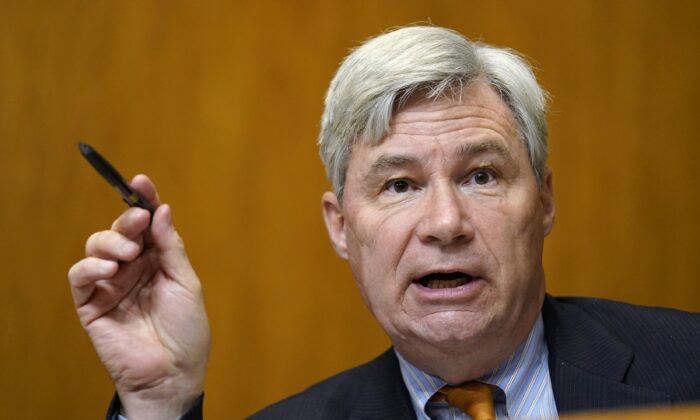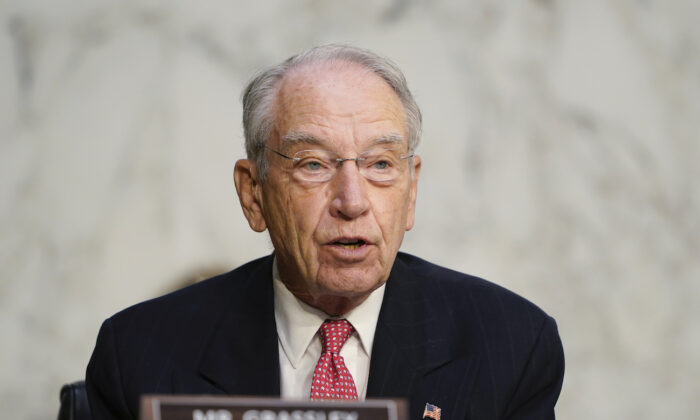


The two trust funds undergirding Social Security will have a zero balance in 10 years, forcing a 25 percent reduction in payments to all beneficiaries, Phillip Swagel, director of the nonpartisan Congressional Budget Office (CBO), reported to Congress.
The Social Security program includes two trust funds, Old-Age and Survivors Insurance and Disability Insurance, which provide 25 percent of the payments made to beneficiaries. Both funds will be exhausted by 2023, according to Mr. Swagel, leaving only revenue from payroll taxes to supply benefits. That will mean an immediate 25 percent cut in benefits the day the money runs out.
“In 2034, Social Security revenues are projected to equal 75 percent of the program’s scheduled outlays, resulting in a 25 percent shortfall. Thus, CBO estimates that Social Security benefits would be reduced by 25 percent in 2034 under the payable-benefits scenario,” Mr. Swagel testified before the Senate Budget Committee on July 12.
Senators of both parties professed a desire to preserve Social Security for future generations.
Committee Chair Sheldon Whitehouse (D-R.I.) said the purpose of the hearing was to figure out “how to close that revenue gap to preserve the promise of Social Security for our kids, or grandkids, working adults, and current retirees will still be alive in 2035. Our promise to them is one we must not break.”
Ranking Member Charles Grassley (R-Iowa) said, “Social Security is part of the social fabric of America, and every Republican agrees with that as well.”
The senators were divided on how to go about saving the system. While Democrats strongly favored increasing taxes on wealthy Americans, Republican leaders advocated considering a range of options, including tax increases, delays to the retirement age, and benefit cuts.
Social Security suffers from the same problem affecting any business or household in financial trouble: more money is being paid out than taken in. That will continue well into the future if no action is taken, according to Mr. Swagel.
“In particular, the number of people in that older age group, who are less likely to work and pay payroll taxes and who are generally eligible for Social Security benefits, grows faster than the number of people ages 25 to 54, who are more likely to work and pay payroll taxes.”
One part of the problem is that Americans are having fewer children, according to Mr. Swagel.
The fertility rate for women ages 14 to 49 was 2.02 children per woman, on average, for the 20 years leading up to 2007, when the rate peaked at 2.12. A fertility rate of 2.1 is considered the replacement rate.
The fertility rate fell to 1.67 by 2020. It is expected to rise to 1.75 by 2030, then remain unchanged for the remainder of the century.
Also, people are living longer. “In CBO’s projections, after 2024, mortality rates decline at the average rate that they declined between 1950 and 2019,” Mr. Swagel said. That means future retirees will likely receive benefits for a longer period than their parents and grandparents did.
In 1940, the first year Social Security benefits were paid, the average life expectancy for Americans was 60.8 years for men and 65.2 years for women. Today it is 73.2 years for men and 79.1 years for women.
Fewer children means fewer people entering the workforce and paying taxes. Meanwhile, the parents and grandparents of those children will live longer in retirement than previous generations did.
Mr. Whitehouse would balance the books by increasing revenue. Specifically, his bill, the Medicare and Social Security Fair Share Act, would raise payroll tax increases on wealthy Americans.
Currently, taxpayers do not pay Social Security taxes on income above $160,200. Mr. Whitehouse’s proposal would apply Social Security taxes to wage, self-employment, and investment income above $400,000.
Sen. Ron Wyden (D-Ore.) believes that current tax laws give billionaires a “free pass” and they need to pay more in taxes.
“Billionaires often don’t report income close to $400,000 because they live off their borrowings. So this can exempt them from bureaucratic hoops like audits and exempt them from taxes for years on end,” Mr. Wyden said.
Democrats see changing the tax code as a matter of basic fairness for working people who are taxed on nearly all of their income.
Mr. Grassley urged Congress to take a bipartisan approach to solving the Social Security problem, following the example of President Ronald Reagan and House Speaker Tip O’Neill (D-Mass.) in the 1980s. Only when both sides work together will a solution be reached, he said.
“When you have candidates for president on the Republican side, and you have a Democratic president in office today, who say ‘We’re not going to touch Social Security,’ how are you going to get things done?” Mr. Grassley asked.
“The only way to reach a deal on Social Security is to follow the Reagan-O’Neill model. That means Congress and the president working in a bipartisan fashion and keeping a chain, a range of options on the table,” Mr. Grassley said, speaking about the agreement forged in 1983 that stabilized Social Security for decades.
President Joe Biden and current House Speaker Kevin McCarthy (R-Calif.) were able to reach a bipartisan agreement in June to cap future federal spending while temporarily increasing the debt limit.
However, Mr. McCarthy has faced sharp criticism from members of the House Freedom Caucus who believe the speaker sacrificed too much to close the deal. Some members mounted a spirited effort to derail the legislation and nearly succeeded in killing it in committee.
Mr. Biden has proposed extending the life of Social Security by increasing payroll taxes on the wealthy while gradually increasing benefits for aged beneficiaries and increasing the minimum benefit for low-wage earners.
Whatever the solution, Mr. Grassley believes it should align with the original vision of Social Security, which ties benefits to contribution.
“President [Franklin D.] Roosevelt wanted the program to have its own dedicated funding source, not be a welfare program, and resemble a private pension plan where benefits you’ll receive reflect the contributions you will pay in. These twin principles of self-financing and earned benefits have been an integral part of Social Security for the last 88 years,” Mr. Grassley said.
As the insolvency of the program draws nearer, senators voiced the urgency for Congress to act.
“Doing nothing means cuts for everyone,” Mr. Grassley said. “Congress and the president, consequently, need to act. The longer we wait, the tougher it will be to fix the problem.
“Raise revenue or cut benefits. These are the only two options,” Mr. Whitehouse said. “ If Republicans stand by their commitment not to cut benefits, they must safeguard revenue to honor our promise to older Americans to retire with dignity.”
Jackson Richman contributed to this report.



